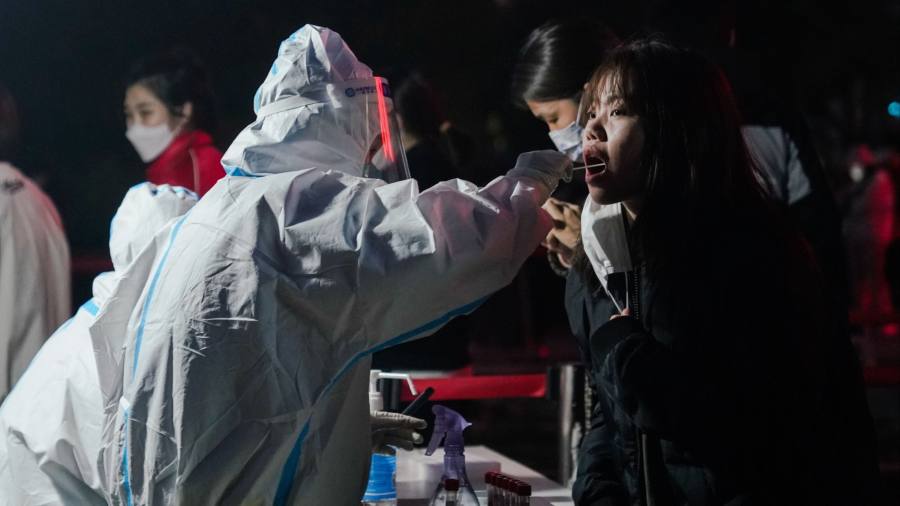
China’s coronavirus test providers have reported a surge in unpaid fees as cash-strapped local governments struggle to fund a mass testing programme that is central to President Xi Jinping’s zero-Covid policy.
Public records show accounts receivable at the country’s 11 main PCR testing companies soared nearly 90 per cent year on year to hit Rmb38bn ($5.4bn) in September.
The payment delays raise questions about the financial sustainability of the zero-Covid policy, which relies on large swaths of the population taking PCR tests every few days, mostly paid for by local governments.
Chinese local authorities are suffering a revenue drop as the world’s second-biggest economy is battered by the strict coronavirus policy and by a property sector downturn.
“There is no way the government could keep paying for mass testing,” said Huang Yanzhong, a senior fellow at the Council on Foreign Relations in New York. “This is not a sustainable operation.”
Beijing’s efforts to eliminate the pandemic, coupled with the real estate meltdown, has taken a toll on the economy that in turn triggered a record 6.6 per cent drop in national fiscal income in the first nine months of this year.
Last month, leading epidemiologist Liang Wannian boasted that China had built the capacity to test 1bn people a day and local governments from coastal Shanghai to inland townships are counting on frequent and state-funded PCR tests to keep the pandemic in check.
Dongwu Securities has estimated China’s testing drive could cost up to Rmb1.7tn a year, or 9 per cent of total fiscal income in 2021.
Few areas can easily afford their share of the bill. Many cities have already postponed payments to PCR test providers without specifying when the money will arrive.
“Local governments are already stretched to the limit when it comes to Covid prevention and control and they have to move money around when they need it [for zero-Covid purposes],” said an official at the health commission of Guangdong, one of the country’s wealthiest provinces.
The situation has alarmed testing companies as they struggle to collect overdue payments.
“We are very concerned about cities in northern China,” said an executive at Shenzhen-based Centre Testing International Group, a leading PCR test provider, referring to a region where local authorities have high levels of public debt. “We are not sure when or whether they will pay us,” the executive said.
On paper, the mostly privately owned Chinese PCR test providers should benefit from continuation of a zero-Covid approach that has brought them a flood of orders. However, as local governments struggle to pay their bills, many are now reporting acute cash flow problems.
Hangzhou-based Dian Diagnostics Group, a leader in Covid testing, reported a 93 per cent jump in net profit for the first three quarters of this year from a year earlier. But Dian’s operating cash flow fell 89 per cent.
“We don’t have a lot of bargaining power in front of government officials,” said an official at Dian.
Xuchang Bo’ao Runkang Medical Diagnostics Laboratory in central Henan province warned this week that it would be forced to stop processing testing samples because orders back to January had not been paid. One Henan official expected others to follow suit.
“The funding gap is too big for us to bridge,” the official said.
Frontline medical staff and local government officials also point to worsening strains on the healthcare system as resources are increasingly diverted to pay for pandemic controls.
“Funding and staffing in other departments are now shrinking, many have not been able to purchase new equipment,” said a doctor at a public hospital in central China’s Wuhan city.
There are signs local governments are running out of funds to pay for mandatory quarantine stays.
A local government official in Baoji in western Shaanxi province said anyone returning to the city from an area designated “high risk” for Covid-19 exposure would be held in quarantine for seven days and be responsible for covering the cost.
“If you have a problem paying, we advise you to borrow from your relatives and friends,” the official said.
Additional reporting by Qianer Liu and Xinning Liu